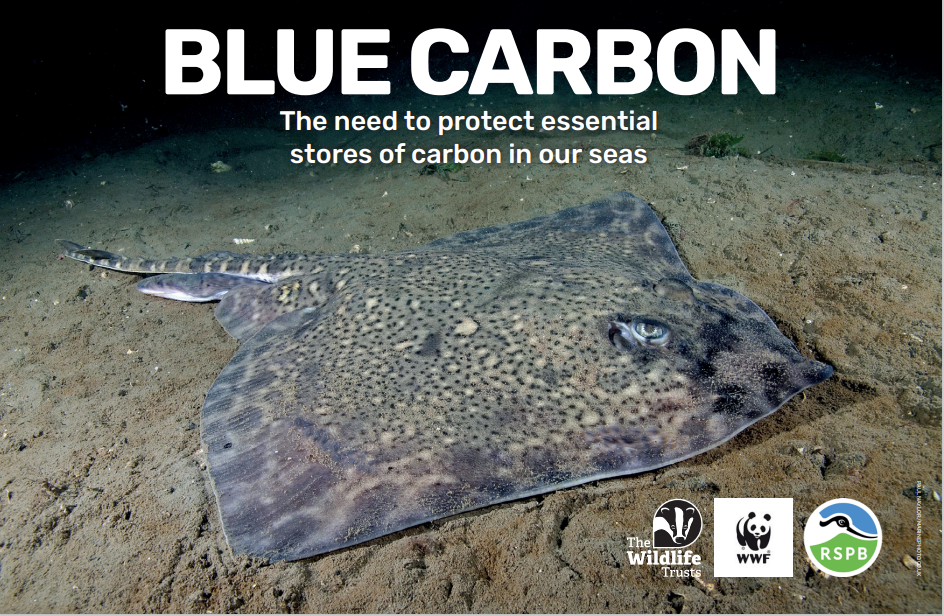

Cornwall Climate Catch Ups: Ruth Williams
Ruth Williams: contributor to 'Under The Surface'.
Ruth is now Head of Marine for The Wildlife Trusts. Read on to hear her thoughts on the progress of marine conservation in the UK...
I was privileged to have been part of the very first Cornwall Climate Care film, Under the Surface, filmed way back in 2021, which was all about how climate change was impacting our seas. I was then Head of Marine Conservation at Cornwall Wildlife Trust and was advocating for how amazing our marine environment is, how important the sea is to all of us, and crucially how marine protection could help protect us against climate change.
I have moved on in my life, and I am now Head of Marine nationally for the whole Wildlife Trust movement, encompassing all 47 individual Trusts. My role is to use the evidence, voices from local communities and examples from the wealth of brilliant local Wildlife Trust projects to influence policy change at national level. I feel incredibly proud to be able to do this and represent our 900,000 members, partners and supporters. It’s been a big change for me personally, but have things moved on equally in terms of marine protection?
.jpg)
Well, not really! We have a great network of designated Marine Protected Areas (MPAs) which cover an impressive 36% of our waters, but frustratingly only 9% of these are effectively managed from damaging activities. I talked about Highly Protected Marine Areas (HPMAs) in the film, and was optimistic that we might be getting some of these in Cornwall, to protect sites at the whole ecosystem level by removing all damaging and extractive activities which would allow real marine recovery. Sadly, despite my optimism and a lot of hard work by many to propose several sites based on strong ecological evidence, only three HPMAs were designated in 2023, with none of those being in the south west. And even more disappointing is that we are still waiting for management of these HPMAs to be brought in, so they are currently still just ‘paper parks’ where all existing damaging activity continues unabated.
In my original interview I was also enthusing about the value of our marine habitats, not just in terms of wildlife but also the carbon they store. Since then, The Wildlife Trusts have undertaken the world’s first mapping of the whole of the UK marine carbon stores – our ‘blue carbon’.
Muddy seabeds around the UK are now known to store a vast 244 million tonnes of carbon within the top 10cms alone, and draw down three times as much carbon from the atmosphere each year as all our forests combined.
And yet our seabeds are still being trashed and damaged by fishing activity and inappropriate developments. You can read the Wildlife Trusts' Blue Carbon report by clicking here.

David Attenborough’s latest film, Ocean, showed very vividly and incredibly powerfully, the destruction that bottom trawling fishing has on the seabed. Footage shows habitats smashed to pieces, wildlife and fish swimming for their lives and indiscriminately being scooped up into huge nets, and crucially, the huge plumes of sediment that are kicked up as the trawl ploughs through the seabed. This activity not only impacts the carbon storage capacity of the seabed, but also releases that carbon BACK into the atmosphere, which makes climate change even worse.

Together with several other NGOs, The Wildlife Trusts have been campaigning for many years for better management of our MPAs and this film has propelled the issue into the limelight, which has resulted in the UK Government announcing a consultation to ban bottom trawling from 41 of our English offshore MPAs to protect the seabed. This is welcome and long overdue and if all proposals are brought in it will not only protect the wildlife but also the carbon stored within these MPAs, a win-win for both nature and climate. But we have to ensure these proposals don’t get weakened and are implemented as rapidly as possible.

I fully appreciate that these proposals will impact some people directly, and difficult decisions need to be made, including consideration of possible displacement of activity into other areas and the need to ensure a just transition for fishers. But if the measures that are being proposed are implemented soon, we can move a lot further towards our goals for both marine recovery and climate mitigation.
So, in summary, we are moving in the right direction, but that change is incredibly slow, particularly at Government level. There is a lack of political will and urgency to implement measures to protect our seas, particularly in light of the current growth agenda but there is progress being made. Individual action at the grassroots level is also needed to make change.
What can you do?
People can help by adding their voice to campaigns and consultations, to let decision makers know that things like bottom trawling can’t continue in our MPAs. Check out The Wildlife Trust pages for how to do this simply and quickly. Click here to write to Minister Harding and let her know why its so important to 'Ban Bottom Trawling'. This consultation closes on 1st September 2025.
In the words of the big man himself, Sir David Attenborough: “If we save the sea, we save the World”. So despite the slow progress since Under the Surface was made by the brilliant Cornwall Climate Care team, I remain positive and we will continue to fight for better protection of our seas.